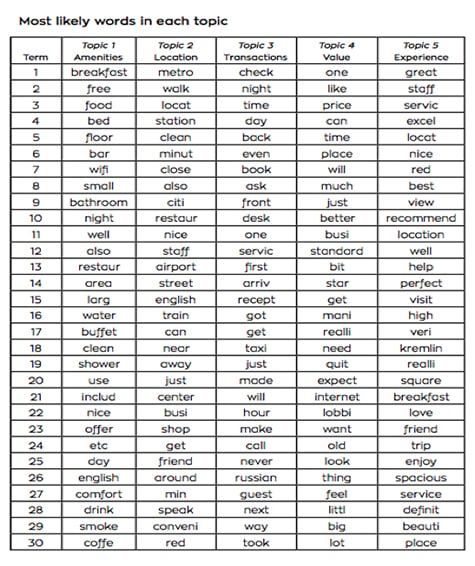New Study Analyzes Consumers’ Hotel Review Behavior

Most hotels are aware that there are deeply valuable insights to be found in the flood of online review and ratings that consumers leave online; the problem is sorting through it all and making sense of how your data fits into larger trends.
What do all those pieces of information mean? Are long reviews about a hotel a good thing? Do short ones mean the visitors were unhappy? What sorts of things do people tend to say about different types of properties? Are the words being used to describe your hotel similar to what people say about competitors?
Luckily, a new in-depth research report from Cornell’s School of Hotel Administration tackles many of these questions. The researchers examined 5,830 TripAdvisor reviews covering 57 hotels in Moscow, Russia, and applied a regression analysis to the relationships of 18,106 distinct terms relating to five specific attributes: amenities, experience, location, transactions, and value.
So what did the researchers find? Here are a few of the key findings (make sure to check out the full report as well, it’s full of detailed insights):
- Negative reviews have a heavier weight in guests’ ratings compared with positive reviews; in other words, guests with bad experiences have a bigger impact on overall rating scores because they give very low grades.
- Negative reviews about a hotel are generally longer and focus on specific hotel attributes; in contrast, positive reviews tend to be shorter in length and talk about the experience in more general terms.
- Dissatisfied guests tend to write more about a hotel’s value and costs in their online reviews compared with guest who have better experiences.
- Top-tier hotels have an average score of 4.4 on TripAdvisor, middle-tier hotels an average score of 4.0, and the lowest-tier hotels have a 3.5 average rating.
- Business travelers constitute the largest proportion of travelers who write reviews, exceeding 40% in all three tiers.
- People comment about different things for different tier hotels; for example, guest experience is mentioned more commonly in reviews of high-tier hotels, amenities and location come up more frequently for those in the middle tier, and guests at lower tier properties write more often about value.
- The same words tend to come up over and over again when consumers talk about hotel amenities, experience, location, transactions, and value online. For instance, here are the most popular terms in each category for the Moscow hotels examined:

So what does all this mean for those in the hospitality business? Some of our biggest takeaways from the research are:
- Negative customer experiences have a huge impact online because these customers tend to leave longer reviews and harsh ratings; do everything you can to appease dissatisfied guests.
- Don’t worry if you’ve got a lot of short, vague comments online about your property; this may simply mean that your customers are happy and don’t have anything to complain about.
- Be especially mindful about business travelers’ experiences at your hotel; these guests are disproportionately likely to leave online ratings and reviews.
- Consumers expect different things from different hotel tiers; make sure you’re focusing on what they value in your segment.
Finally, the report is a good reminder that online sentiment data is extremely valuable to your hotel. This doesn’t mean that you have to constantly run rigorous textual analyses of every available piece of information (though it wouldn’t hurt). It does mean, however, that you should take the time to monitor comments about your property on social media and review sites; with regular check-ins, you’ll be able to detect patterns yourself and identify major issues before they become major problems that impact your business.
Discover ways to monitor hotel reviews and drive engagement. Contact MDG today at 561-338-7797 or visit www.mdgsolutions.com.
MDG, a full-service advertising agency with offices in Boca Raton and New York, NY, is one of Florida’s top hospitality marketing companies and branding firms. MDG’s core capabilities include advertising, branding, logo design, creative, infographic development, digital marketing, creative media planning and buying, radio and TV advertising, website design and development, email marketing, mobile marketing, content marketing, social media marketing, and SEO. To stay on top of the latest trends in hospitality marketing and advertising, contact MDG today at 561-338-7797.
